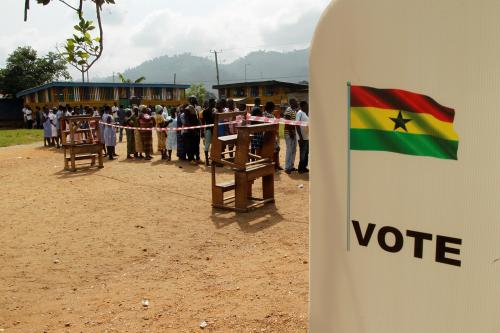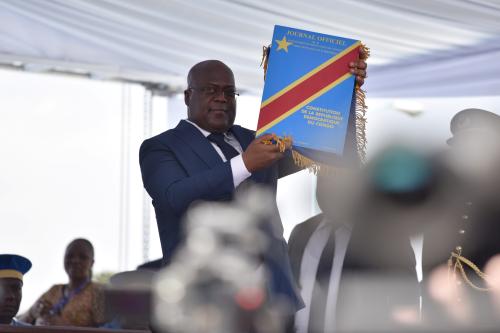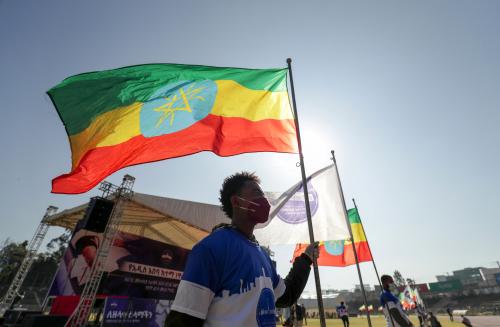Experts predict uneven economic growth across sub-Saharan Africa
On Wednesday, the International Monetary Fund (IMF) announced that the Democratic Republic of the Congo (DRC) is expected to grow 5.4 percent in 2021 and 6.4 percent in 2022. In a news conference announcing the new estimates, IMF Managing Director Kristalina Georgieva praised the DRC for its economic performance during the pandemic: The world’s top cobalt producer “benefits from higher commodity prices,” Georgieva said, “but above all benefits from the reforms that the president and the government have been pursuing.” The DRC’s growth figures outpace estimates for sub-Saharan Africa more broadly, which are 3.7 percent and 3.8 percent for 2021 and 2022, respectively.
On the other hand, South Africa risks missing its forecasted growth of approximately 5 percent, according to economists at PricewaterhouseCoopers (PwC). Data from Statistics South Africa reveals that Africa’s second-largest economy grew at 5.8 percent over the first three quarters of the year, but the emergence of a new COVID-19 variant and corresponding travel bans imposed by more than 90 countries have experts worried that growth will slow in the final quarter. In fact, PwC estimates that the travel restrictions alone might cost the country as much as $406 million in foreign-derived revenue. Cascading effects could “pull down the full-year average to below 5 percent,” said Cape Town-based PwC Economist Christie Viljoen.
Meanwhile, this week, Briter Bridges Intelligence, an Africa-focused business analytics firm, reported that African startups are expected to raise $5 billion in funding in 2021. Notably, this amount is greater than the sum of the previous three years combined. According to the firm, this investment uptick is partially due to the appeal of financial technology (or “fintech”) businesses on the continent, which has helped give rise to four “unicorns” (privately held companies valued over $1 billion) in the fintech sector: Flutterwave, Interswitch, Fawry, and Jumia.
The Gambia votes, and Burkina Faso’s prime minister resigns
On Sunday, the Independent Election Commission of the Gambia announced incumbent President Adama Barrow won re-election with nearly 53 percent of the vote—a significant margin over his main challenger, Ousainou Darboe from the United Democratic Party, who received approximately 28 percent. Citing polling station irregularities among other issues, some opposition leaders are contesting the credibility of the election, and protests by supporters of the opposition have been met with tear gas dispersed by police. However, African Union election observers stated that “the election was conducted in line with international standards” and observers from the European Union “praised the transparency of the voting and counting process.” Notably, this presidential election marks the first election in decades that long-time president, Yahya Jammeh, now living in exile in Equatorial Guinea, did not participate, following his loss of the 2016 election and his refusal to accept those election results.
In other political news, Burkina Faso’s president, Roch Marc Christian Kabore, accepted the resignation of Prime Minister Christophe Dabire, amid escalating national security instability marked by recurring al-Qaida- and ISIS-linked insurgent attacks since 2016. These attacks have killed roughly 2,000 people and displaced over 1 million. Notably, the removal of the prime minister, according to the laws of Burkina Faso, “requires the entire Cabinet to step down.” Prior to their official departure, the outgoing government will “remain in a caretaker capacity until a new one is formed.”
Tanzania plans to lift media bans as the number of jailed reporters are at a global high
On December 7, authorities in Tanzania stated they plan to lift bans and suspensions on media organizations who had been forced to stop operating under former president, John Magufuli. Elaborating on the new policy, Deputy Permanent Secretary in the Ministry of Constitution and Legal Affairs Amon Mpanju relayed that the Tanzanian government is working with media owners and the Tanzania Human Rights Defenders’ Coalition with hopes to resolve freedom challenges within the country.
On the other hand, in a report released on Thursday, the Committee to Protect Journalists shows that, no sub-Saharan African country ranked among the top-five worst jailers, though Egypt ranked third. Within sub-Saharan Africa, the Committee to Protect Journalists ranks Ethiopia “as the second-worst jailer of journalists in sub-Saharan Africa, after Eritrea” noting that, during its ongoing internal conflicts, Ethiopia experienced the biggest setback for media freedom in the region. The report also decries Benin’s charging of two journalists with cybercrimes under the country’s digital code, which allows criminal prosecution for anything published or distributed online.










Commentary
Africa in the news: Economic, political, and media freedom updates
December 11, 2021